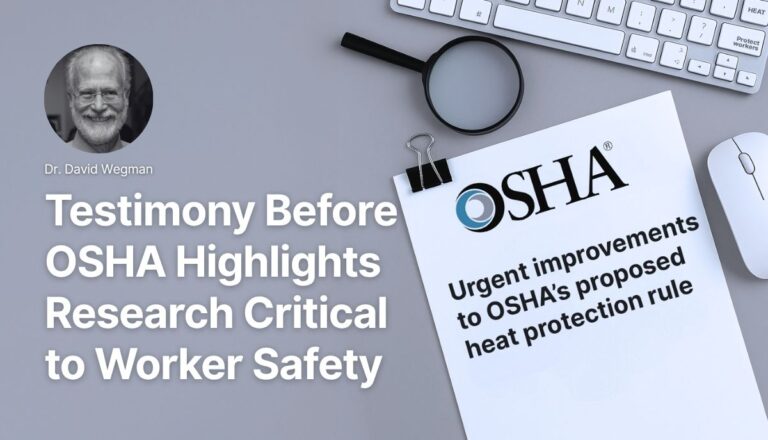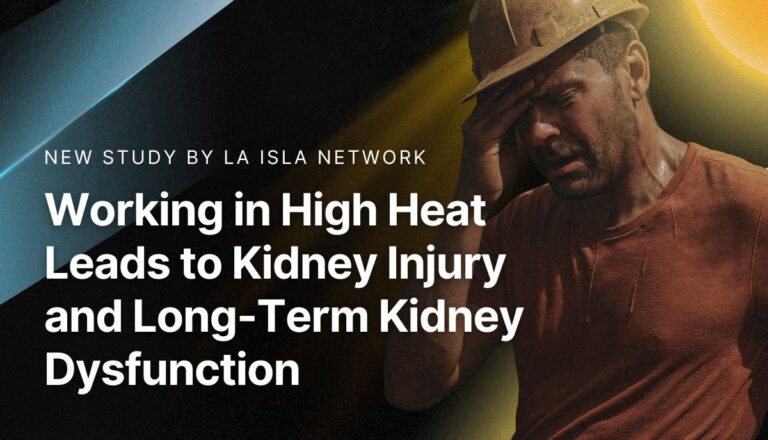Published Papers
Home » Published Papers » Page 2
Targeting workload to ameliorate risk of heat stress in industrial sugarcane workers
Investigators
David Wegman
Journal
Scandinavian Journal of Work, Environment & Health
Published date:
9 Oct 2022
Excerpt
Objective: The aim of this study was to quantify the physiological workload of manual laborers in industrial sugarcane and assess the effect of receiving a rest, shade, and hydration intervention to reduce heat stress exposure risk. Methods: In an observational study, physiological workload was evaluated for burned cane cutters (BCC), seed cutters (SC) and drip irrigation repair workers (DIRW) using heart rate (HR) recorded continuously (Polar®) across a work shift. […]
Inhaled silica nanoparticles cause chronic kidney disease in rats
Investigators
Julia Wijkström
Journal
American Journal of Physiology-Renal Physiology
Published date:
1 Jul 2022
Excerpt
Silica nanoparticles (SiNPs) released during the burning of sugarcane have been postulated to have a role in chronic kidney disease of unknown etiology. We tested the hypothesis that pristine SiNPs of the size present in sugarcane might cause chronic kidney injury when administered through the lung in rats. We administered 200- or 300-nm amorphous SiNPs twice weekly (4 mg/dose), or vehicle by oropharyngeal aspiration for 13 wk to rats followed […]
Workplace Intervention for Heat Stress: Essential Elements of Design, Implementation, and Assessment
Investigators
Catharina Wesseling, David Wegman, Denis Chavarria, Esteban Arias-Monge, Jason Glaser, Kristina Jakobsson, William Martinez-Cuadra
Journal
International Journal of Environmental Research and Public Health
Published date:
22 Mar 2022
Excerpt
Heat stress is associated with numerous health effects that potentially harm workers, especially in a warming world. This investigation occurred in a setting where laborers are confronted with occupational heat stress from physically demanding work in high environmental temperatures. Collaboration with a major Nicaraguan sugarcane producer offered the opportunity to study interventions to prevent occupational heat-stress-related kidney disease. Two aims for this study of a rest-shade-water intervention program were: (1) […]
Markers of kidney tubular and interstitial injury and function among sugarcane workers with cross-harvest serum creatinine elevation
Investigators
Kristina Jakobsson
Journal
Occupational & Environmental Medicine
Published date:
31 Dec 2021
Excerpt
Objectives: Serum creatinine (SCr) is a routine marker of kidney injury but also increases with dehydration and muscular work. This study was to elucidate whether increase in SCr is associated with more specific markers of kidney tubular and interstitial injury and function, during prolonged heat stress among workers at high risk of chronic kidney disease of non-traditional origin (CKDnt). Methods: Urine monocyte chemoattractant protein-1 (MCP-1), kidney injury molecule-1 (KIM-1), calbindin, […]
Dying for sport
Investigators
Jason Glaser
Journal
Occupational & Environmental Medicine
Published date:
7 Dec 2021
Excerpt
Public health professionals in host coun- tries can help address the critical health needs of immigrants, but for migrant workers there is a particular need for the focused attention of the occupational health community. One case where that community must be more engaged was documented by Amnesty International: ‘In the prime of their lives’ Qatar’s failure to investigate, remedy and prevent migrant workers’ deaths.1 There is good evidence that the […]
The Prevention of Occupational Heat Stress in Sugarcane Workers in Nicaragua-An Interpretative Phenomenological Analysis
Investigators
Esteban Arias-Monge
Journal
Frontiers in Public Health
Published date:
12 Oct 2021
Excerpt
Background: Chronic kidney disease of non-traditional origin (CKDnt) is an ongoing epidemic that has taken the lives of tens of thousands of people in Mesoamerica, also affecting other tropical geographies. Occupational heat stress, which will increase worldwide as climate change persists, has been identified as a primary trigger of kidney injury and reduced renal function. At Nicaragua’s largest sugarcane mill, the water, rest, and shade (WRS) intervention has proven to […]
Climate change and nephrology
Investigators
Jaime Butler-Dawson
Journal
Nephrology Dialysis Transplantation
Published date:
2 Sep 2021
Excerpt
Climate change should be of special concern for the nephrologist, as the kidney has a critical role in protecting the host from dehydration, but it is also a favorite target of heat stress and dehydration. Here we discuss how rising temperatures and extreme heat events may affect the kidney. The most severe presentation of heat stress is heat stroke, which can result in severe electrolyte disturbance and both acute and […]
Occupational heat exposure and the risk of chronic kidney disease of nontraditional origin in the United States
Investigators
Zachary Schlader
Journal
American Journal of Physiology-Regulatory, Integrative and Comparative Physiology
Published date:
1 Aug 2021
Excerpt
Occupational heat exposure is linked to the development of kidney injury and disease in individuals who frequently perform physically demanding work in the heat. For instance, in Central America, an epidemic of chronic kidney disease of nontraditional origin (CKDnt) is occurring among manual laborers, whereas potentially related epidemics have emerged in India and Sri Lanka. There is growing concern that workers in the United States suffer with CKDnt, but reports […]
Prevalence Studies on CKDu Need Stringent Reporting on Outcomes to Enhance Comparability
Investigators
Jason Glaser
Journal
International Journal of Environmental Research and Public Health
Published date:
5 Oct 2020
Excerpt
Prevalence studies on Chronic Kidney Disease of unknown etiology (CKDu) need stringent reporting on outcomes following existing guidelines. Only by doing so, the much-needed comparisons between occupations, regions and climates for the elucidation of the etiology/etiologies of CKDu, and subsequently for its prevention, are possible. We, here, comment on methodological issues in a recently published study on rice farmers from West Java, Indonesia.
Pathophysiological Mechanisms by which Heat Stress Potentially Induces Kidney Inflammation and Chronic Kidney Disease in Sugarcane Workers
Investigators
David Wegman
Journal
Nutrients
Published date:
2 Jun 2020
Excerpt
Background: Chronic kidney disease of non-traditional origin (CKDnt) is common among Mesoamerican sugarcane workers. Recurrent heat stress and dehydration is a leading hypothesis. Evidence indicate a key role of inflammation. Methods: Starting in sports and heat pathophysiology literature, we develop a theoretical framework of how strenuous work in heat could induce kidney inflammation. We describe the release of pro-inflammatory substances from a leaky gut and/or injured muscle, alone or in […]
Preventing kidney injury among sugarcane workers: promising evidence from enhanced workplace interventions
Investigators
David Wegman
Journal
Occupational & Environmental Medicine
Published date:
13 May 2020
Excerpt
Objectives: To assess if improvement of working conditions related to heat stress was associated with improved kidney health outcomes among sugarcane harvest workers in Chichigalpa, Nicaragua, a region heavily affected by the epidemic of chronic kidney disease of non-traditional origin. Methods: Based on our findings during the 2017-2018 harvest (harvest 1), recommendations that enhanced the rest schedule and improved access to hydration and shade were given before the 2018-2019 harvest […]
Chronic kidney disease of non-traditional origin in Mesoamerica: a disease primarily driven by occupational heat stress
Investigators
Kristina Jakobsson
Journal
Pan American Journal of Public Health
Published date:
27 Jan 2020
Excerpt
The death toll of the epidemic of chronic kidney disease of nontraditional origin (CKDnt) in Mesoamerica runs into the tens of thousands, affecting mostly young men. There is no consensus on the etiology. Anecdotal evidence from the 1990s pointed to work in sugarcane; pesticides and heat stress were suspected. Subsequent population-based surveys supported an occupational origin with overall high male-female ratios in high-risk lowlands, but small sex differences within occupational […]







